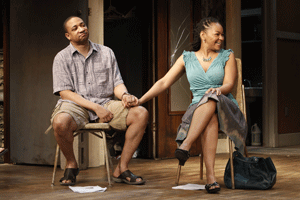Clybourne Park, a terrific new Off-Broadway play, takes its name from the white neighborhood that the African-American Younger family dreamed of moving into in Lorraine Hansberry’s 1959 hit “A Raisin in the Sun.”
In “Raisin” the head of the Clybourne Park Neighborhood Association, a weasel named Karl Lindner, comes to the Youngers’ inner-city apartment to convince them not to move into the neighborhood. Act I of “Clybourne Park” portrays Lindner’s visit later that day to the white family, who, for reasons of their own, are eager to sell the house at a marked-down price to the Youngers. In neither play does Lindner succeed.
In Act II, set in 2008, we see a reversal: An upscale white couple is eager to move into Clybourne Park. It had become totally African-American in the 1960s after struggling through years of economic decline, drugs and crime and is now a target for white gentrification.
A dark but often laugh-out-loud comedy, “Clybourne Park” reveals a racism that still simmers 50 years later. The first 20 minutes of Act I, in which a white husband and wife engage in trivial conversation, made at least this audience member itchingly uncomfortable with the superficial appearance and underlying anxiety of their life. Later in Act I, when Lindner is angrily ordered by the white owner to leave his house, he refuses to go. As Lindner prolongs his argumentative threats, the tension grows unbearable. A similarly painful unease mounts in Act II as the white yuppie looking to move in rants about racial understanding and displays covert prejudices that are nonetheless apparent to the African-Americans in the room. The house at 406 Clybourne Street becomes a metaphor for an abiding evil that continues to haunt its inhabitants and visitors.
The playwright Bruce Norris has a bright future in American theater, and I hope that readers everywhere can discover him when “Clybourne Park” arrives at their favorite playhouse, as it surely must.
Photo: Joan Marcus








